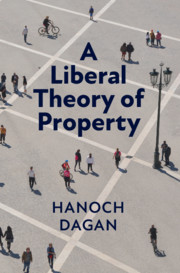Book contents
- A Liberal Theory of Property
- A Liberal Theory of Property
- Copyright page
- Dedication
- Contents
- Preface
- 1 Liberal Property
- 2 Some Basics
- 3 Autonomy and Private Authority
- 4 Property’s Structural Pluralism
- 5 Property’s Relational Justice
- 6 Making Property Law
- 7 Just Markets
- 8 Property Transitions
- 9 Afterword
- Notes
- Index
1 - Liberal Property
Published online by Cambridge University Press: 04 March 2021
- A Liberal Theory of Property
- A Liberal Theory of Property
- Copyright page
- Dedication
- Contents
- Preface
- 1 Liberal Property
- 2 Some Basics
- 3 Autonomy and Private Authority
- 4 Property’s Structural Pluralism
- 5 Property’s Relational Justice
- 6 Making Property Law
- 7 Just Markets
- 8 Property Transitions
- 9 Afterword
- Notes
- Index
Summary
A long tradition in Western political thought connects property and liberalism. John Locke is probably the most familiar liberal theorist to give property a place of honor in his account of the state. But Locke, whose property theory is fraught with difficulties, is certainly not the only one. The right to property is often understood as one of the necessary implications of the status of individual natural persons as free and equal, which may explain its inclusion in the Universal Declaration of Human Rights.
- Type
- Chapter
- Information
- A Liberal Theory of Property , pp. 1 - 12Publisher: Cambridge University PressPrint publication year: 2021

